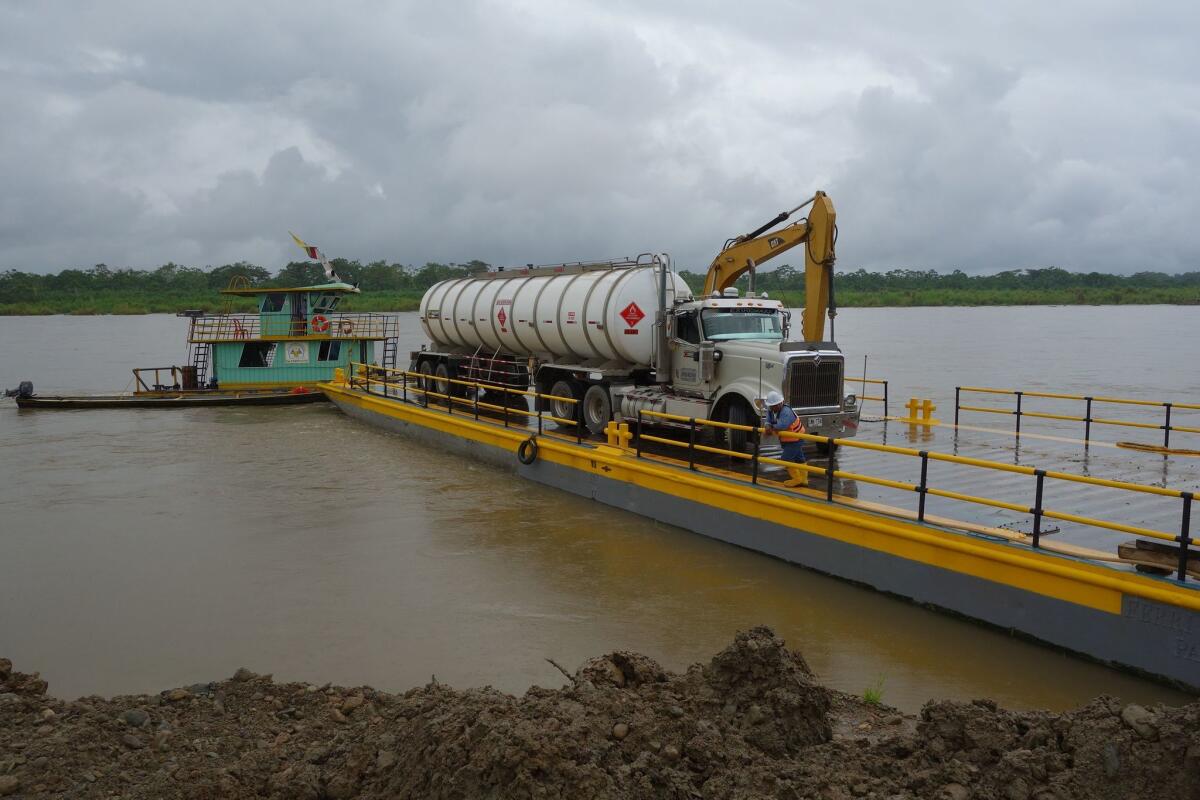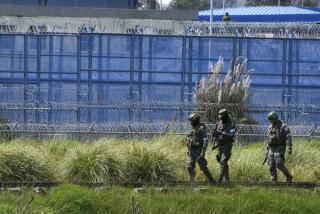Rebel attacks on oil sites threaten peace talks in Colombia

A tanker truck is shown being ferried across the Putumayo River in southern Colombia on Saturday. FARC guerrillas last week forced drivers of 22 of the vehicles to dump their loads on highways around Puerto Asis.
Already-stagnant peace talks between the Colombian government and leftist rebels have been thrown further into question by a score of attacks by insurgents on mostly civilian targets over the last week.
The violence has “struck at Colombians’ confidence in the process,” President Juan Manuel Santos said.
The week of violence by suspected rebels of the Revolutionary Armed Forces of Colombia (FARC) was especially directed at oil pipelines and infrastructure. There also were numerous attacks on high-tension electric power towers, leaving an estimated 1 million people in the cities of Buenaventura, Tumaco and Florencia temporarily without power.
On Friday a district commander of the Colombian National Police was killed along with a patrolman after their vehicle was ambushed in southern Narino state. Col. Alfredo Clavijo of the Ipiales district was killed with a close-range bullet wound, police commander Gen. Rodolfo Palomino said.
In videotaped comments released Saturday to reporters in Rome, a stop on an extended trip designed in part to solicit post-conflict economic aid from European countries, Santos described the attacks as “senseless” but vowed to push ahead with the peace talks, which began in Havana in November 2012.
“When we began talks with the FARC more than 2 1/2 years ago, we agreed we would negotiate amid the conflict and I traced some red lines that we would not cross,” Santos said. “We shouldn’t forget that one of those red lines is that we would talk amid the conflict.”
The attacks were especially felt in this southern Colombian region where suspected rebels, in two separate incidents, forced drivers of 22 tanker trucks to disgorge their loads of crude oil on rural roadways, polluting pastures and a stream that feeds into the Putumayo River, which empties into the Amazon.
Residents in Putumayo province said the attacks will only aggravate economic woes caused by a recent downturn in the price of crude oil, which in turn has forced the shutting of wells, layoffs of hundreds of oil field workers and the idling of dozens of tanker trucks used to haul crude.
The attacks will make oil companies even more reluctant to operate and will harm the livelihoods of poor workers, said transport owner Luciano Tello. “Before, we had all kinds of business shuttling drivers. So did restaurants and hotels in the city. Boys found work at the wells easily. But it’s dried up,” said Tello.
Nora Dominguez, owner of a roadside café east of Puerto Asis and less than a mile from where three tanker trucks on Thursday were forced by rebels to discharge their loads on a gravel road, said only four or five trucks pass per day, down from 25 or 30 a year ago. “It’s really quiet now and it will get worse,” she said.
Meanwhile, a spokesman for state-controlled oil company Ecopetrol said the company was still battling to keep a separate spill caused by the June 8 bombing of the Transandino Pipeline from emptying into the Pacific Ocean at the port city of Tumaco. The spill diverted up to 170,000 gallons of crude into a stream that empties into the Rosario River.
The new wave of rebel violence is the most serious since peace talks started in November 2012 in Havana in a bid to end the 50-year-old conflict, the hemisphere’s longest running war. It was also the first coordinated series of attacks since the rebels called off their five-month cease fire on May 22.
The FARC’s motive is thought to be a show of strength to force the government to agree to a bilateral cease-fire, something the Santos government has refused to do until a overall peace agreement has been signed, said Bruce Bagley, a Colombia specialist at the University of Miami.
“President Santos has taken the high road in insisting that the talks must continue despite the recent escalation of violence until a find accord is reached,” said Virginia Bouvier of the United States Institute of Peace. But “the FARC has made a miscalculation. With more violence they will not gain ground at the negotiating table, and they can prejudice the prospects for the ratification of any final agreement they might produce.”
Adam Isacson, a Colombia researcher at the Washington Office on Latin America, a think tank in Washington, said that despite the upsurge in violence, the odds are good that the peace talks will continue, noting that slow but incremental progress has been made. But the future hinges on whether the attacks continue.
“It’s a bump in the road if the attacks stop this week, but if it’s a sustained offensive, it will make Colombians even more angry and force the Santos government to get up from the table and suspend the process,” Isacson said. “The danger in a suspension is it could become permanent.”
French sociologist and Colombia expert Daniel Pecaut, who has advised the Santos government in the negotiations, said he doubts that at this stage any political faction in Colombia really wants the talks to end because it would constitute a “leap into the unknown.”
Although the negotiations have produced tentative agreements on three of five major points and, more recently, joint cooperation in de-mining and the formation of a truth commission, the two sides have been at a standoff since May of last year on the issue of “transitional justice.”
That’s the broad term for the post-conflict issue of whether FARC commanders will stand trial and serve prison time for crimes against humanity, a prospect the rebels reject. A poll published in early May in Semana magazine indicated that 89% of Colombians believe FARC leaders should do time if convicted of such crimes, an important indicator since any final peace deal will be submitted to a national vote.
“Supposing that a deal is arrived at one day in Havana, how will the referendum go given the growing hatred toward the FARC?” Pecaut said.
Kraul is a special correspondent.
More to Read
Start your day right
Sign up for Essential California for news, features and recommendations from the L.A. Times and beyond in your inbox six days a week.
You may occasionally receive promotional content from the Los Angeles Times.






